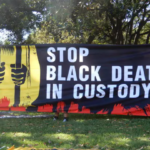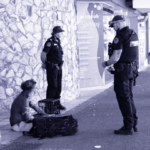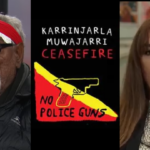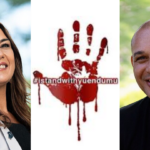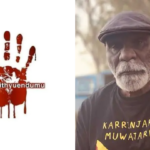Racist NT Cop Killed Warlpiri Teen for Adrenaline Rush and Likely Expected to Get Off

In delivering a summary of her mammoth final findings into the death of Kumanjayi Walker, Northern Territory coroner Elisabeth Armitage found that former NT police constable Zachary Rolfe was known to dehumanise and devalue Aboriginal people, he routinely prioritised the use of excessive force, he worked for an institution that fosters racism, and all this contributed to the killing of the teen.
Warlpiri Luritja teenager Kumanjayi Walker was 19, when Rolfe, a 28-year-old fourth year NT police constable, and his partner Adam Eberl, entered House 511 in Yuendumu.
Rolfe then shot Walker three times: once in the back, following the teen having hit him in the shoulder with scissors, and twice at “close range” into the side of his chest, as Eberl was on top of him and had him in a headlock.
Armitage made certain, as she delivered her summary at the remote Aboriginal community of Yuendumu, where Kumanjayi lived, that prior to and on entry into House 511, Rolfe was acting as he regularly did, rushing in without regard to consequences, prioritising “getting his man” and doing so in a “high risk/high adrenalin” manner, as he got off on conducting reckless policing.
The NT coroner was also highly critical of the culture of the Northern Territory Police Force, which she found to involve “a work environment that tolerated, or normalised, racism”. So, at the police station in Mparntwe-Alice Springs racist and dehumanising terms are regularly used when discussing work matters, as numerous officer text messages viewed by the inquiry reveal.
But despite finding that NT law enforcement was complicit in the killing of Kumanjayi, in terms of fostering racist and dehumanising attitudes towards First Peoples, Armitage ultimately put the death of Kumanjayi Walker down to “officer induced jeopardy”, which means Rolfe entered the house looking for a violent confrontation, and this led to his shooting the teenager dead.
“Officer induced jeopardy”
“Kumanjayi’s death in Yuendumu on 9 November 2019 was avoidable,” NT coroner Elisabeth Armitage made certain last Monday, 7 July 2025. “Although in some significant respects the failures were institutional, I share the view of the use of force experts and several highly experienced senior police officers, who said this was a case of officer induced jeopardy.”
The NT coroner then defined officer induced jeopardy as “situations where officers needlessly put themselves in danger, making themselves and others vulnerable and creating a situation that justifies the use of deadly force”. Armitage further added that Rolfe did not prioritise safety when attempting to arrest Walker, despite local police being well aware that the teen had “poor impulse control”.
Kumanjayi had just three days earlier ran at two Yuendumu community police while holding an axe to avoid arrest, so NT police knew “that there needed to be a carefully planned arrest to avoid that situation”.
So, on 9 November 2019, an officer at Yuendumu police station had devised such an arrest plan for 5 am the next morning. However, when Rolfe, an Immediate Response Team officer, was told about the plan, he instead rushed in to arrest Walker first.
According to Armitage, Rolfe approached the teen in the house in a manner that made it possible for Walker to respond aggressively. After he attempted to strike Rolfe with scissors, which the constable deflected, so it hit him in the shoulder, Eberl struck the teen in the face and grabbed his arm, then Rolfe moved back and pulled out his Glock pistol and “without warning” shot the teen in the back.
Indeed, the NT police constable never gave any standard warning prior to shooting his gun three times, and the Aboriginal boy died a little over an hour later.
“In accordance with the Coroners Act”, Armitage explained, “I am not allowed to make any finding that suggests Mr Rolfe or any other person is guilty of a criminal offence. Further I must not make a comment or finding that undermines the jury verdict that Mr Rolfe is not guilty in relation to discharging the second or third shots, which killed Kumanjayi in House 511.”
Tacit approval from on high
“I find that Mr Rolfe was racist and that he worked in and was the beneficiary of an organisation with all the hallmarks of institutional racism,” Armitage further set out. “I am satisfied that there is significant risk that his racism, in combination with some of his other attitudes and values affected his interactions with the community of Yuendumu on 9 November 2019.”
Armitage referred to the 2022 Galliott report into NT police, which found that “skin colour” can often shape the decisions made by officers, which “rang true” with the outcomes of the Walker inquest, as it was found that complaints had been made by First Peoples about Rolfe, which were “mishandled” or simply overlooked.
“By the middle of 2019, NT Police was on notice that Mr Rolfe needed closer supervision, as multiple complaints had been made on behalf of Aboriginal arrest targets that he had used excessive force, sometimes causing head injuries, and these complaints were – or ought to have been – under investigation,” the coroner assessed.
Rolfe had been called out several times in the past about “not activating his body-worn video (BWV) during some arrests”, and, according to Armitage, “it should have been obvious that action was required to minimise the potential risk posed to the public. However, in the absence of appropriate oversight, Mr Rolfe’s tactics were tacitly and sometimes expressly approved”.
“The failure of NT police to properly supervise Mr Rolfe, or to rein him in, contributed to a sense of impunity, with which he approached his work as a police officer, and emboldened his approach.”
The NT coroner set out that there had been five previous incidents where Rolfe had used excessive and inappropriate force. There were two other questionable incidents of serious concern, and multiple others where he unnecessarily used force. His policing involved a prioritisation of the use of force against Aboriginal men and boys, which at times, resulted in injuries to these suspects.
A paid holiday
During her summary of her damning assessment, Armitage did not, however, mention Rolfe’s brief relationship with fellow Alice Springs constable Claudia Campagnaro, which lasted from February to September 2018. But the coroner outlines in her report that she had “no difficulty accepting the credibility of Ms Campagnaro”.
Rolfe’s one-time romantic partner gave compelling evidence, according to the report, in regard to Rolfe’s suspect “text messages, his recording and dissemination of BWV of his use of force” and she collaborated “his own evidence as to widespread use of racist language in the NT police… and his desensitisation to it”.
Campagnaro further “gave evidence that Mr Rolfe made a number of deeply concerning statements about his attitudes to the use of force, his attraction to violence and ‘killing’”, and that he had a “desire to ‘shoot someone’ during the course of his work as a police officer so that he could go on paid leave”.
This paid leave scenario would suggest that Rolfe considered that he would not be found guilty if he shot someone. In the case of shooting a First Nations person, the odds are that he would get off, even if the person he shot was killed, as no police officer or corrections officer in Australia has ever been convicted in relation to the overwhelming number of Aboriginal deaths in custody.
Just like clockwork, Rolfe was acquitted by an all-non-Indigenous jury in March 2022. This was despite being charged with a sliding-scale of offences. He was acquitted of murder, and he was also found not guilty of manslaughter: killing without the intent to do so. And the well-oiled machinery of the Australian criminal justice system also found him not guilty of violent act causing death.
In fact, Rolfe is currently running a private investigation company and is also listed as one of Platinum Speakers’ public speakers. And when he does address an audience at an event, Rolfe specialises in providing advice on such topics as “leadership, crisis management and ethical decision-making”.



